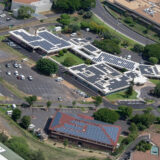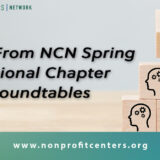Six Tips to Incorporate Shared Space in your Nonprofit’s Office
Is your organization ready to get out of the rental market and build a lasting asset? You should consider including shared space for other organizations as part of your plan.
While designing your project to generate revenue from shared space users, can strengthen your case to lenders and improve the long-term financial sustainability of your project, that’s not the real value.
Shared space connects your organization and its work to a wider community of nonprofits or social ventures, increases staff retention by making your organization a more vibrant and interesting place to work, and raises your organization’s profile through your role as a dynamic community hub.
We have found this to be true at Tides. We are a backbone organization to philanthropic and social change communities, and have operated Tides Thoreau Centers in San Francisco and New York City since 1996 and 2006 respectively. We have seen enormous benefits from owning and operating shared space and see these facilities as the physical manifestation of our other infrastructure work, including
- Having mission-aligned tenants, like RSF Social Finance, the Pachamama Alliance, and Open Government Partnership, means the building is filled with people deeply connected to the communities we serve. Everyday activities – walking the halls or eating lunch in the café – are done alongside people who are embedded in social good work, but perhaps from a different perspective or sector. Serendipitous run-ins are an organic way to keep Tides’ staff’s ears to the ground in a way they wouldn’t be by reading reports or attending conferences alone.
- Our community members and tenants help us deliver on our mission to accelerate social change. They host events that push dialogue forward on the toughest issues we face like inequality and environmental sustainability. And their proximity to one another sparks innovative ideas and new connections that can lead to greater impact.
- We meaningfully contribute to the social change community (beyond Tides’ other services) through the provision of stable, below market rents. Social change organizations who share space at the Thoreau Centers can redirect important resources from rent to their programs and services, which is especially critical in volatile real estate markets like San Francisco.
While Tides has seen many benefits from owning and operating real estate that includes shared space, we offer these key considerations for organizations just beginning the real estate journey:
- The old adage of real estate is truer than ever: location, location, location.Continued urbanization and the desire for walkable, transit oriented development means that the right spot is as important as ever for both your own staff and any organizations you’ll be courting to share your space.
- Conduct a thorough feasibility study.Feasibility studies are the cornerstone of figuring out if adding shared space will be worth your while, allowing you to assess the marketplace, understand your target tenancy, and run the numbers to see if the project can be cash positive. Organizations like the Nonprofit Centers Network can help you with this process.
- Consider all of your square footage options.Depending on what you intend to charge for rent (at market or below market), you will need decide just how much square footage will justify the operational and staff costs associated with the project.
- Plan a flexible space.The way work is changing and the office of the future looks different than it does today. As you begin to work on a high-level design, make sure the space can be easily reconfigured. Learn to appreciate the notion of “everything on wheels” so that each space can be transformed in minutes and by users themselves.
- Design for collaboration.If you commit to shared space, consider a design that connects your staff and shared space users in ways that encourages a free-flow of ideas and solutions. Spaces that encourage lingering, abundant rolling white boards, and long farm-style tables can launch collaborations of all types from building networks to more intensive efforts like joint fundraising or sharing staff. Check out this whitepaper from Steelcase to for space design tips.
- Be intentional about your staffing plan.Organizations sometimes try to bundle the management of the space into an existing role, which, in our experience, rarely works well. Having a dedicated staff member to manage leases, conference rooms, and other needs will help ensure the shared space doesn’t become an afterthought. You may also want to consider a staff member dedicated to facilitating relationships and catalyzing collaboration, which can be a value-add to existing users, attract new tenants, and generally better activate the space.
If your organization is considering buying or constructing a building, we encourage you to add shared space. Your project can be more than just a home for your organization: it can also serve as a community hub that attracts ideas and talent, and ultimately builds collective impact by synergizing multiple organizations’ work.
This blog is an excerpt from a post entitled ”Why Nonprofit Offices Should Include Shared Space: Key Considerations when your Organization Gets into Real Estate” which originally appeared on What’s Possible: The Tides Blog http://blog.tides.org/2016/08/02/why-nonprofit-offices-should-include-shared-space-key-considerations-when-your-organization-gets-into-real-estate/
By Saul Ettlin, Collaboration + Space Manager, Tides







